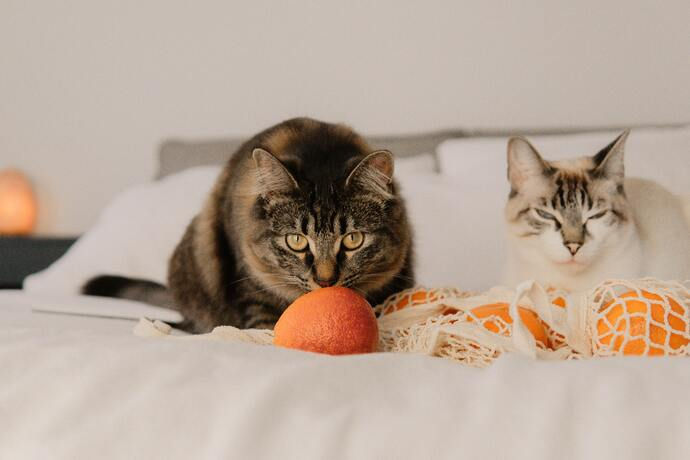
Cats, known for their discerning tastes and unique dietary preferences, may surprise their human companions by showing interest in various fruits. While cats are obligate carnivores, meaning their diet primarily consists of meat, some fruits can be a healthy and enjoyable addition to their nutrition.
However, it's crucial for cat owners to be aware of which fruits are safe for their feline friends and to offer them in moderation.
So, lets explore what fruits can cats eat.....
Apples: Apples, when offered in small, bite-sized pieces with seeds and cores removed, can be a safe and tasty treat for cats. Apples are a good source of fiber and certain vitamins, contributing to a well-rounded diet.
Bananas: Bananas, in moderation, can be a delightful and nutritious option for cats. High in potassium and vitamins, bananas are a healthy treat, but due to their natural sugar content, they should be given sparingly.
Blueberries: Packed with antioxidants and essential nutrients, blueberries are a safe fruit for cats to consume. These tiny, flavorful berries can be offered fresh or frozen, providing a refreshing and healthy snack.
Strawberries: Strawberries are another cat-friendly fruit that can be shared in moderation. Rich in vitamin C and antioxidants, strawberries can be sliced into small pieces to prevent choking hazards.
Watermelon: Cats can enjoy small, seedless watermelon chunks as a hydrating and low-calorie treat. Ensure that the watermelon is free of seeds and rind, and introduce it gradually to observe your cat's response.
Cantaloupe: This sweet and juicy melon is safe for cats when served in small, seedless portions. The high water content in cantaloupe can contribute to hydration, but as with any treat, moderation is key.
Pumpkin: Both pumpkin flesh and cooked pumpkin seeds can be beneficial for cats. Pumpkin is rich in fiber and can aid in digestive health. However, it's important to offer plain, cooked pumpkin without added sugars or spices.
Pears: When peeled and sliced, pears can be a cat-friendly fruit option. Packed with vitamins and fiber, pears make for a healthy and refreshing treat.
Cautions and Considerations:
While some fruits can be a nutritious addition to a cat's diet, certain precautions should be taken:
Pits and Seeds: Always remove pits, seeds, and cores from fruits before offering them to your cat, as these can pose choking hazards or contain harmful substances.
Moderation is Key: Fruits should be offered in moderation, as excessive consumption can lead to digestive upset or weight issues.
Allergies and Individual Sensitivities: Cats, like humans, can have individual sensitivities or allergies. Introduce new fruits gradually, monitoring your cat for any adverse reactions.
Consult with a Veterinarian: Before introducing any new foods into your cat's diet, it's advisable to consult with your veterinarian. They can provide personalized advice based on your cat's specific health needs.
Incorporating cat-friendly fruits into your feline friend's diet can add variety and nutritional benefits. However, responsible pet ownership involves being aware of which fruits are safe, removing potential hazards, and ensuring that treats are given in moderation. By doing so, you can offer your cat a tasty and healthy assortment of fruits that complement their carnivorous diet.
Always prioritize your cat's well-being and consult with your veterinarian for guidance on the best diet for your unique feline companion.

Comments